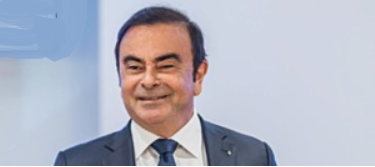
Part Lebanese, part Brazilian citizen Carlos Ghosn, made the escape of his life at 10:30pm on a cold December night in 2019, by slipping unnoticed through the streets of Tokyo, with the help of a large music equipment box to smuggled him out of Japan and the elation he felt when he landed in his native Lebanon.
Carlos Ghosn, a former titan of car industry was once boss of both Nissan and Renault was arrested in November 2018, over allegations by Nissan that he had understated his annual salary and misused company funds, when he was the chairman of France’s Renault and the boss of a three-way alliance between both carmakers and Mitsubishi, which he denies.
His cost cutting at Nissan, was ultimately seen to have saved the carmaker and be became a highly respected and recognisable figure. He was the collateral damage in a fight back from Nissan against the increasing influence of Renault which still owns 43 per cent of the Japanese company.
He lived like a head of state, and his 60th birthday party at the Palace of Versailles saw him hold court with waiting staff dressed a pre-revolutionary garb. Those at Nissan feared he would oversee a French coup of traditional Japanese business he saved and those at Renault disliked his shunning of the establishment and appearance in the pages of Paris society magazines.
His arrest at Tokyo airport three year ago which Ghosn said “It’s like you’re being hit by a bus or something really very traumatic happened to you. The only memory I have of this moment is shock, frozen Trauma”.
Mr Ghosn was taken to the Tokyo Detention Centre where he was given prison clothes and confined to a cell. “All of a sudden I had to learn to live without the watch, without the computer, without the mobile phone, without the new, without the pen – nothing”.
For over a year Mr Ghosn was kept in custody or held under house arrest in Tokyo after being bailed with no indication of when a trial would take place. If convicted Ghosn could face 15 years in prison, in Japan which has a 99.4 per cent conviction rate. Mr Ghosn said is working with lawyers to clear his name and until then he remain a once-big-fish in a small pond, living in exile and under armed guard in Beirut for the near foreseeable future.
He was also not even allowed to contact his wife.
“The plan was I could not show my face so I have to be hidden somewhere, and the only way I could be hidden was to be in a box or in a luggage so nobody could see me. Nobody could recognise me and the plan could work” Ghosn said. The idea of using a large box that would normally contain musical instruments was the most logical one, particularly that around this time there were a lot of concerts in Japan” Ghosn further said.
From Tokyo Mr Ghosn travelled by bullet train to Osaka where a private jet was waiting at a local airport to depart. But first, the box, which was waiting for Mr Ghosn in a near by hotel.
“When you get in the box you don’t think about the past, you don’ think about the future, you just think about the moment.” Ghosn said.
Mr Ghosn was transported from the hotel to the airport by two men, father an sone Michael and Peter Taylor who were posing as musicians. Mr Ghosn was inside the music box for an hour and a half. The private jet took off on time and Mr Ghosn now free from his confines flew through the night, swapped planes in Turkey before landing in Beirut the next morning.
Lebanon does not have an extradition treaty with Japan so Mr Ghosn has been allowed to remain there.
Americans, Michael Taylor and his son Peter have since been handed over by the US to Japan and now they face three years in prison for helping Mr Ghosn to escape.
Greg Kelly, Mr Ghosn’s former colleague at Nissan, who remains under house arrest in Tokyo over allegations he helped his former boss disguise his earnings which Mr Kelly denies.
